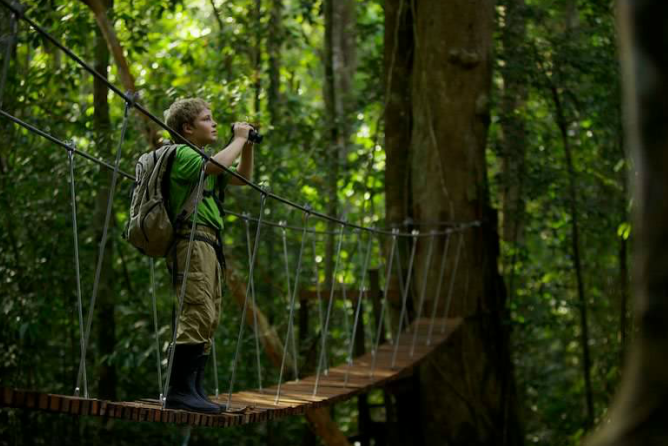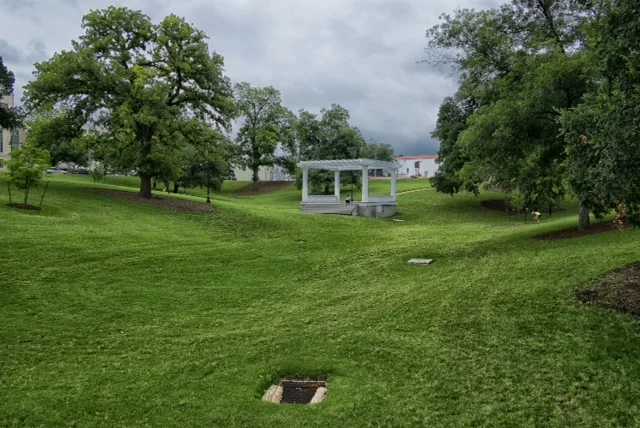Children, Faith, Spirit, Nature (Chris Searles)
Hi, I'm Chris Searles editor and cofounder of AllCreation.org. This month we're doing a special edition of our magazine. Here's why -- About three months ago, I was asked to share my spiritual awe and passion for protecting and restoring Earth’s biodiversity by Rev. Felix Malpica, Assistant Pastor at Shepherd of the Hills Lutheran Church in Austin, Texas. Felix's invitation led to many great things. One of them was meeting Pastor Tom Grevlos' wife, Jeanne Grevlos. After services that Sunday she introduced herself:
“Hi, I’m Jeanne, principal of the preschool here. I really liked what you had to say... Whenever we have a behavioral issue we don't discipline the child, we just take them outside. Then everything turns out fine."
This fascinated me. I have a theory brewing that human beings are more engaged in nature than in any other “environment,” especially if they have an appreciation for what they’re seeing. Studying biodiversity on a daily basis, I am constantly made curious by the other life forms surrounding us.
Here’s my working thesis -- We humans are innately happier, calmer, and less self-obsessed (more engaged in the moment) when we are:
- Outdoors, feeling safe and physically comfortable
- Open to and aware of the dynamism and multiplicity of living things around us (especially the miracles of small things in insects, soil, and vegetation)
- Surrounded by other people (of any age) who are having or sharing the same experience: playing, learning, hanging out with us.
Visiting Jeanne's preschool was an adventure. Her passion for connecting preschoolers to the wonders of Creation permeates everything at Butterfly Christian Preschool. She’s one of the most energized, articulate and inspired people I have ever met and her philosophy is based in two things: experience and prayer. I have since introduced Jeanne to my mother, a former principal, and proselytized to all who would listen about this amazing educational experience. Their model moves preschoolers through early childhood development in empowering, self-motivated, and self-directed ways, strengthening each child's overall sense of self and others. It's a happy, often magical, place.
Why is this so important? Part of the vision for winning today's environmental challenges is to re-engage ourselves with the rewards of being outdoors in nature. Forests like the one at Jeanne's preschool are ideal. Stuck at IKEA with a four-year-old recently and worried we would run out of things to do, I wondered -- why can’t we build curated natural forest systems with large shady trees at our schools, workplaces, retail centers, community halls, havens, and sanctuaries? Why not?
Children will play for hours in nature, strengthening all kinds of developmental necessities and reducing stress on parents. As Jeanne says -- those “unfiltered” preschoolers receive gobs of stimulus outdoors: touch, sight, sound, smell, emotion, heart, discovery, play, learning, making, thinking, interacting, exercising, socializing, overcoming physical challenges, using intuition and imagination, problem solving and observing dynamism. Everything is pretty fluid. These things are hard to access sitting still indoors. Even better, Jeanne's preschoolers are outdoors with their friends. At Butterfly Christian Preschool the children get to do all of these things in right sized groups with maternalistic protectors (school staff) under shady trees, making the student's time at school far more rewarding, their learning more engaging. Forests nurture health, growth, spirit, cognition, engagement, relationships, development, dexterity, and education.
The ecological benefits of bringing back forests are extensive. Some of the concrete rewards include: reducing and relieving stress, pest management (forests house bats and birds), pollination (birds, bats & insects are pollinators), restoring biodiversity, slowing global warming, maintaining a more temperate local climate, absorbing air and water pollutants, producing oxygen, filtering fresh water, increasing soil health, sequestering carbon and other air pollutants, reducing flood and drought intensity, increasing local food supplies, creating more places for children to learn and play in a self-directed manner, creating more places for worship, education and personal reflection, restoring aquifers and hydrology... the list goes on. Suffice to say, increasing the amount of trees and wilderness we expect to see on a daily basis is a good thing.
People, no matter what age, are more fulfilled in an enjoyable, outdoor setting than any other. Yes -- key words "enjoyable outdoor setting," but forests like the one at Butterfly Christian Preschool easily provide shade, shelter, comfort, and loads of living things to watch and engage with. From trees limbs to caterpillars to owls and leaves dancing in the light, once a person learns to appreciate the small things in nature -- the living things all around us, that person becomes more fulfilled; whether child or adult. Best of all, in Nature personal fulfillment takes place at each individual’s pace, your pace, regardless of age, ability, or attention span. All are welcome.
###
This month we have ten short blogs on Jeanne Grevlos and Butterfly Christian Preschool by intern extraordinaire Katie Knight and myself. (Check out Katie's curation work on the BioIntegrity Tumblr page.) We also have reflections and stories on the benefits of educating children in nature by AllCreation team members Rev. Tom VandeStadt, Rev. Carmen Retzlaff, Amie King, and special guest Jessica Malpica. Wendell Berry sets the tone.
Thanks for visiting.
This month's theme, The benefits of educating children outdoors.
We hope you enjoy this special edition of AllCreation.org.
###
related: Bratman, et al (2015). Nature Experiences Reduce Rumination. PNAS
cover photo by Tim Laman
inset photo by Katie Knight







